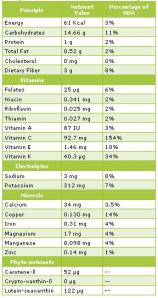 The kiwi is a small fruit that packs a wallop of nutrition. It contains more vitamin C than an orange. The national fruit of China, where it has been called a macaque peach, vine pear, or hairy bush fruit, among other names, it was introduced to New Zealand at the turn of the last century. The kiwi was called the Chinese gooseberry before its name was changed to kiwifruit upon its move to the USA in the 1960s. Currently, Italy, New Zealand, Chile, France, Japan and the United States are the world's top producers of kiwis.
The kiwi is a small fruit that packs a wallop of nutrition. It contains more vitamin C than an orange. The national fruit of China, where it has been called a macaque peach, vine pear, or hairy bush fruit, among other names, it was introduced to New Zealand at the turn of the last century. The kiwi was called the Chinese gooseberry before its name was changed to kiwifruit upon its move to the USA in the 1960s. Currently, Italy, New Zealand, Chile, France, Japan and the United States are the world's top producers of kiwis. Health benefits of Kiwi fruit
- Kiwifruit is a very rich source of soluble dietary fiber (3.8 g per 100 g of fruit OR 10% of RDA), which makes it a good bulk laxative. The fiber content helps to protect the colon mucous membrane by decreasing exposure time to toxins as well as binding to cancer-causing chemicals in the colon.

- The fruit is an excellent source of antioxidant vitamin-C; providing about 154% of the DRI (daily-recommended intake). Consumption of foods rich in vitamin-C helps the body develop resistance against infectious agents and scavenge harmful free radicals.
- Kiwi fruit contains very good levels of vitamin-A, vitamin-E, vitamin-K and flavonoid anti-oxidants such as beta-carotene, lutein and xanthin. Vitamin K has a potential role in the increase of bone mass by promoting osteotrophic activity in the bone. It also has established role in Alzheimer's disease patients by limiting neuronal damage in the brain. Total antioxidant strength measured in terms of oxygen radical absorbance capacity (ORAC) of kiwifruit (gold, raw) is 1210 µmol TE/100 g.
- Research studies have shown that certain substances in kiwi-fruit functions as blood thinner function similar to aspirin; thus, it helps prevent clot formation inside the blood vessels and protect from stroke and heart-attack risk.
- Kiwi-fruit seeds are an excellent source of omega-3 fatty acids. Research studies show that consumption of foods rich in omega-3 fatty acids may reduce the risk of coronary heart disease, stroke, and help prevent the development of ADHD, autism, and other developmental disorders in children.
- Fresh kiwi fruit is a very rich source of heart-healthy electrolyte "potassium." 100 g contains 312 mg or 7% of daily-recommended levels of this electrolyte. Potassium is an important component of cell and body fluids that help regulate heart rate and blood pressure by countering malefic effects of sodium.
- It also contains good amounts of minerals like manganese, iron and magnesium. Manganese is used in the body as a co-factor for the powerful antioxidant enzyme, superoxide dismutase. Magnesium is an important bone-strengthening mineral like calcium.
Sources:
USDA National Nutrient data base
livelife365 - YouTube
http://www.nutrition-and-you.com
http://www.healthdiaries.com
Reblogged this on The healthiest beauty.
ReplyDeleteHi, Thanks!
ReplyDeleteHurrah! At last I got a website from where I know
ReplyDeletehow to actually obtain helpful facts regarding my study and knowledge.